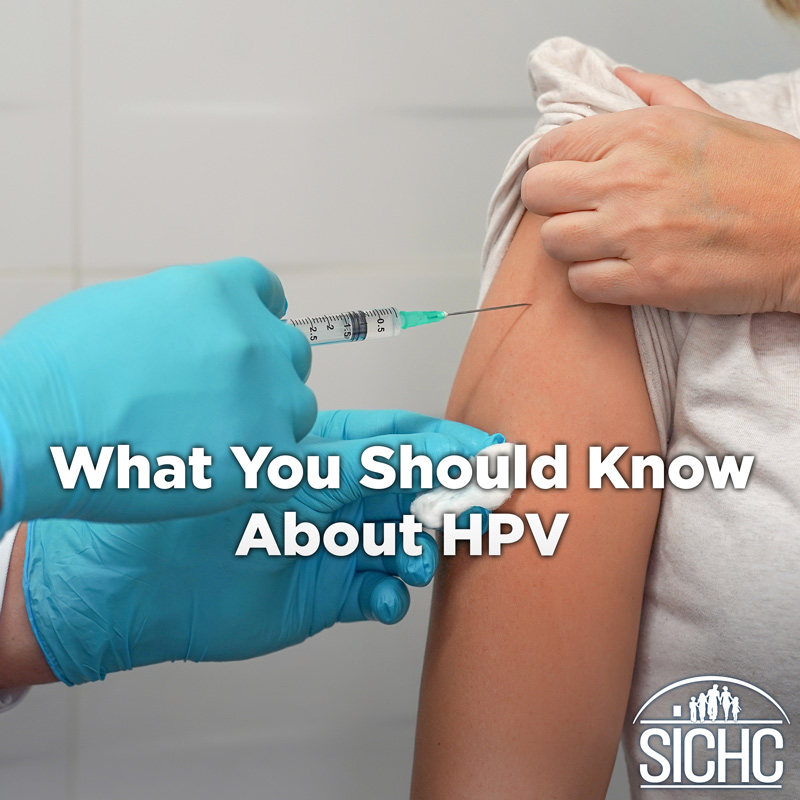What You Should Know About HPV

By Stephanie Frye – Family Nurse Practitioner
There are more than 150 different types of HPV. They can range in appearance from small, painless, rough-surfaced warts to larger, more painful and flatter plantar warts. According to the CDC, 85% of people will get HPV infections in their lifetime
And while being called a “wart” doesn’t sound all that serious, it can be if your body doesn’t clear out the virus on its own. HPV causes about 44,000 cancers in men and women each year in the US, from cervical cancer (the leading cause) to cancers of the vagina, vulva, penis, anus, and mouth, according to Harvard Health. According to the CDC, more women (about 25,400) than men (about 19,900) develop HPV-associated cancers in the United States each year.
Here’s what else you should know about HPV
HPV is the most common sexually transmitted infection. While using condoms consistently and correctly can lower the chances of acquiring and transmitting HPV and developing HPV-related diseases, it’s not a fool-proof strategy, according to the CDC, because the virus can also infect areas that aren’t covered. Limiting the number of sex partners can reduce the risk, although even if you have only one lifetime sex partner, you can still get HPV. The only reliable method for preventing genital HPV infection is abstaining from sexual activity.
The FDA has only approved tests to find HPV in individuals with a cervix. Positive results can be then managed with extra testing and prompt treatment if the infection causes abnormal cell growth. (Note: There is no approved HPV test to find HPV in the mouth or throat.)
The HPV vaccine has a 15-year track record of success. Since the HPV vaccination was first recommended in 2006, there has been a significant reduction in HPV infections, with fewer teens and young adults getting genital warts. The HPV vaccine has the potential to prevent more than 90% of HPV-attributable cancers and has also reduced the number of cases of precancers of the cervix in young women. The HPV vaccine offers long-lasting protection against HPV infection and HPV disease—even against new HPV infections. This makes the vaccine a valuable weapon against causal HPV infection for cancers since it can take decades after the infection for the cancer to be diagnosed.
HPV is thought to cause 70% of oropharyngeal cancers in the United States – cancer in the back of the throat, tongue or tonsils. The vaccine protects against the types of HPV that can cause this cancer and can prevent this cancer from developing.
The HPV vaccine is safe and effective for children ages 9-12. Why start that early? According to Claire McCarthy, MD, Senior Faculty Editor at Harvard Health Publishing, the HPV vaccine is most effective if it’s done before your teen becomes sexually active. Those who haven’t been vaccinated at an early age can have a catch-up vaccination—recommended for females and certain special populations through age 26, and for males through age 21, according to the CDC. The Cervarix and Gardasil vaccines protect against most cases of cervical cancer; Gardasil also protects against most genital warts. Both vaccines are recommended for girls and women, while only the Gardasil is recommended for boys and men. Recently the HPV vaccine eligible age has been increased to 45. People aged 27 to 45 should discuss HPV vaccination with their doctor and their decisions on an individual basis.
The more you know about HPV, the better you can protect yourself and your children. While the Healthy People 2020 goal was to reach 80% in terms of HPV vaccination coverage, a study in JAMA Pediatrics showed that the U.S. was far below that number. Part of the reason may be that most adults, men and women, weren’t well informed about HPV, HPV vaccination, and the relationship between HPV and cancer. For example, more than 70% of adults didn’t realize that HPV causes oral, anal, and penile cancers. Since parents make HPV vaccination decisions for their children, it’s important to discuss the need for this vaccine with your doctor or your child’s pediatrician.
- After Hours Nurse
- Behavioral Health
- Bill Pay
- Breast Cancer
- Children
- Children's Health
- Chronic Care
- Community
- Covid-19
- Diabetes
- Doctor Visit
- Eating Well / Nutrition
- Financial Wellness
- Follow My Heart
- Grief
- Health Tips
- Heart Health
- Hypertension
- Kidney Health
- Medical History
- Mens Health
- Mental Health
- Motherhood
- Obstetrics
- Pain Management
- Payment Info
- Pediatric Care
- Pregnancy
- Rural Healthcare
- Schools
- Senior Health
- SICHC Services
- Sleep
- Sports Medicine
- Stroke
- Team Based Care
- Telehealth
- Uncategorized
- Virtual Doctor Visit
- Wellness
- What to Know…
- Womens Health
- Pregnancy and Health Information and Resources
- Healthy Pregnancy – A short guide for mothers-to-be
- Summer fun and eating healthy
- Dangers of Teen Vaping – and What You Can Do
- Four health facts for Father’s Day
